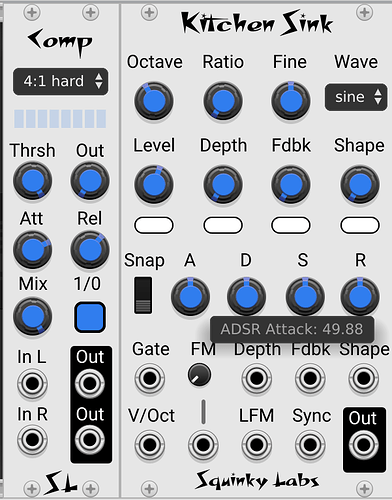I’ve never worked with hardware modular, and I’ve only been using VCV for less than 1 year.
I decided to time the various stages of the VCV Fundamental. Not the easiest thing to do precisely, as there are no gates or triggers indicating when each stage transitions to the next. But I was shocked by how off my timings are compared to the settings on the various parameters.
It does not seem to make a difference between V1 and V2 - qualitatively they seem the same. Also it does not seem to make much difference for very short, medium, or long stage lengths. They all seem equally “wrong”.
I’ll just give some numbers for the ADSR in V1:
I used the Submarine LA-108 and HS-101 to take measurements.
I set Attack, Decay, and Release all to 1000ms (1 sec), and the Sustain to 50%. I held the gate open until the Decay light went out, and then released as quickly as my reflexes would allow. Here are the measurements I gathered
Attack stage - 1.7 sec, reached 10V
Decay stage - 4.3 sec, reached 5.08V. That is 80mV higher than I expected
Release stage - ~5 sec to reach 0.08V (I assume the tolerance should be consistent)
The Attack timing is the only one that seems close to reasonable, but it is still off much more than I expected. The others are waaaaayyyy off. And the results are repeatable.
Also, I was a bit surprised the decay/release voltage tolerances were as high as ~ 80 mV as best as I could tell. My guess is it might be as high as 0.1V.
Are timings typically off that much in the modular world? Should I expect envelope timings to be very rough estimates. To my eyes those numbers are even worse than rough estimates.
Also, what voltage tolerances should I expect?
I did a quick check of the Bogaudio DADSR(H)+, which is much easier with the stage gates. I did the same basic test, and everything was spot on - both timings and voltages.
So which is more representative of a “typical” envelope generator?


